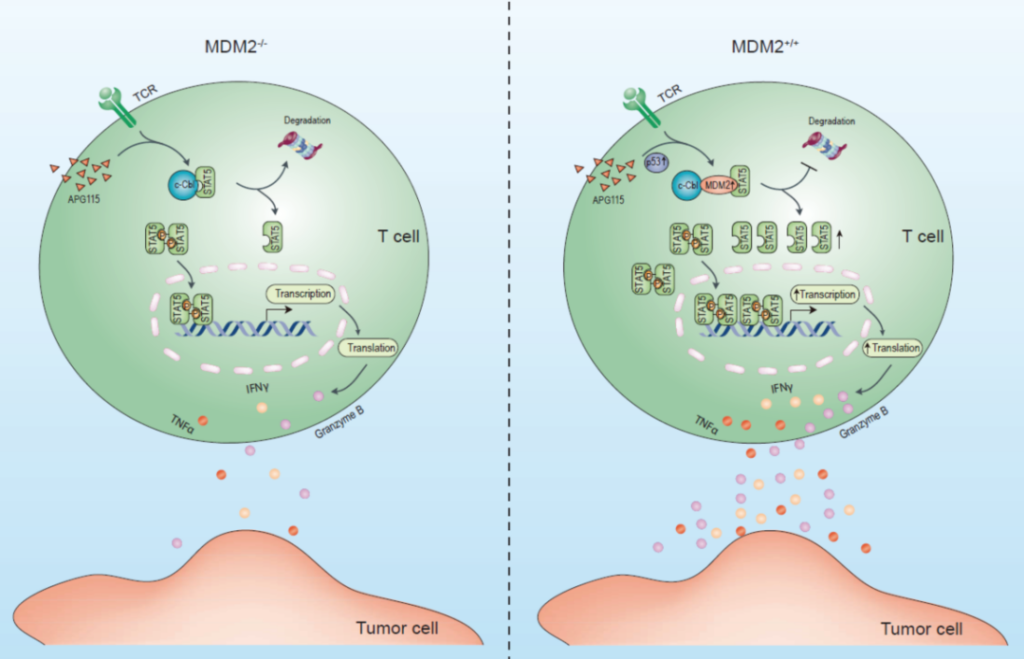A new mechanism for T cells to regulate tumor immunity
- Normal Liver Cells Found to Promote Cancer Metastasis to the Liver
- Nearly 80% Complete Remission: Breakthrough in ADC Anti-Tumor Treatment
- Vaccination Against Common Diseases May Prevent Dementia!
- New Alzheimer’s Disease (AD) Diagnosis and Staging Criteria
- Breakthrough in Alzheimer’s Disease: New Nasal Spray Halts Cognitive Decline by Targeting Toxic Protein
- Can the Tap Water at the Paris Olympics be Drunk Directly?
A new mechanism for T cells to regulate tumor immunity
A new mechanism for T cells to regulate tumor immunity. Nature Sub: Zou Weiping’s team discovers a new mechanism for T cells to regulate tumor immunity.
This study found that the E3 ubiquitin ligase MDM2 and p53 interaction pathway is an important T cell immunotherapy target.
Among many tumor types, about 50% of tumor patients are caused by the loss of p53 inhibition of tumor function.
CD8+ T cells play a central role in tumor immunity and are a decisive factor in the treatment effect and prognosis of cancer patients.
Although the function of MDM2-p53 has been analyzed in detail in tumor cells, it is not clear whether this signaling pathway regulates CD8+T cell-mediated tumor immunity, which greatly hinders the development and application of related therapeutic strategies.
On March 25, 2021, the team of Professor Weiping Zou from the University of Michigan published an online title in the journal Nature Immunology:
The E3 ubiquitin ligase MDM2 has the intrinsic role of T cells, supports the research of anti-tumor response, and clarifies the MDM2-STAT5 signal axis regulating T cell-mediated tumor immunological mechanism.
This study found that the E3 ubiquitin ligase MDM2 and p53 interaction pathway is an important T cell immunotherapy target. MDM2 has the intrinsic role of T cells and supports the anti-tumor response. This study clarified the T cell-mediated tumor immunological mechanism of the MDM2-STAT5 signal axis.
This research completely refreshed people’s understanding and provided a new theoretical basis for the immunotherapy of related tumor patients.
Professor Weiping Zou from the University of Michigan is the corresponding author of the paper, and Jiajia Zhou, a postdoctoral fellow, is the first author.
In order to analyze the function of the MDM2-p53 signaling pathway in T cells, the research team constructed mouse models that specifically knocked out MDM2 and p53 in T cells. In vivo and in vitro experiments have shown that MDM2 regulates the survival and function of CD8+ T cells independent of p53 activity.
Further research found that MDM2 regulates the stability of STAT5 in CD8+ T cells, which is essential for effective anti-tumor immunity. Mechanism studies have shown that MDM2 prevents the binding of c-Cbl and STAT5, reduces c-Cbl-mediated degradation of STAT5, and enhances the stability of STAT5 in tumor-infiltrating CD8+ T cells.

A schematic diagram of the functional mechanism of c-Cbl-MDM2-STAT5 signal axis regulating T cell-mediated tumor immunity
From the perspective of drugs, the researchers used the small molecule drug APG-115 that targets the interaction of p53 and MDM2 to significantly inhibit tumor growth. At the same time, APG-115 can induce the expression of MDM2 in CD8+ T cells, stabilize STAT5 expression, enhance the function of tumor infiltrating CD8+ T cells, and have a synergistic effect with immunotherapy, regardless of the status of tumor p53. In addition, the abundance of MDM2 is related to the T cell function and IFNγ signal of cancer patients. Therefore, the disease indications of small molecule drugs that target the interaction of p53 and MDM2 can be extended to tumors with p53 mutations, thereby greatly increasing the therapeutic indications of such drugs.
Professor Shaomeng Wang from the University of Michigan is a key partner in this project. Professor Wang Shaomeng is the designer of APG-115. APG-115 was authorized by the University of Michigan to Yasheng Pharmaceutical and has entered clinical trials.
This study found that the E3 ubiquitin ligase MDM2 and p53 interaction pathway is an important T cell immunotherapy target. MDM2 has the intrinsic role of T cells. It is customary to think that the interaction between MDM2 and p53 is a tumor biological pathway. This research completely refreshed people’s understanding and provided a new theoretical basis for the immunotherapy of related tumor patients.
(source:internet, reference only)
Disclaimer of medicaltrend.org



